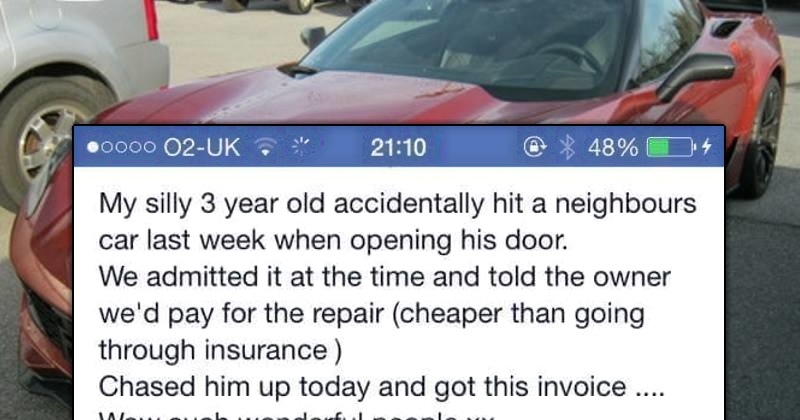When a three-year-old little boy opened his mother’s car door into a neighbor’s vehicle, it resulted in a small dent to the other car. Wanting to do the right thing, his mother offered to pay for the damages her son had caused. After she received the bill, however, she was left nearly speechless by what she saw on it.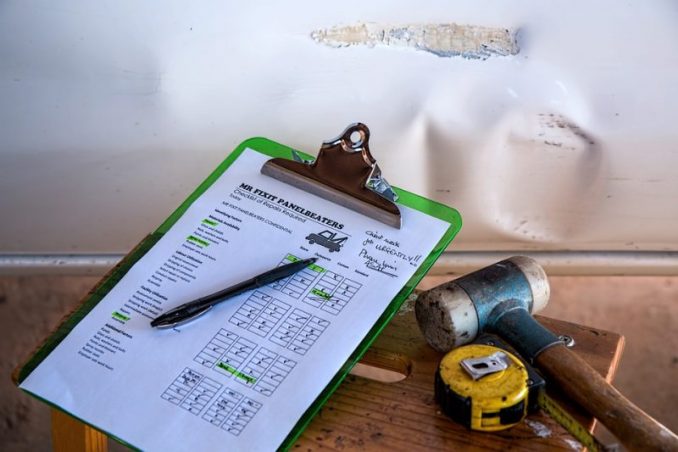
Stock image (Photo Credit: Pixabay)
A U.K. mother found herself in a bit of a conundrum after her toddler’s carelessness caused damage to their neighbor’s car. Most of us can relate to what she was feeling in that moment. A child, whom you are responsible for, flings open the car door without a car in the world, then you hear that unmistakable “crunch.” So, what do you do?
Sadly, some would pretend they didn’t notice and hope the owner of the vehicle didn’t either. But, this mom wanted to do what was right. Of course, she wanted to do it as cheaply as possible since, like most of us, she didn’t have copious amounts of money to spare. Even so, she was well aware that the repair was her responsibility, so she owned up to the accident.
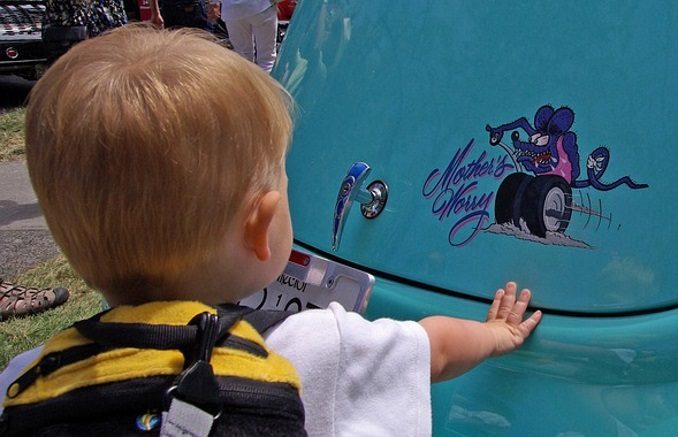
Knowing that reporting the incident to insurance could be costly, she decided to offer to pay for the repair out of pocket instead, according to the Metro. Apparently, the neighbor was fine with this decision, sending the woman a bill for her child’s mistake the following week. After one look at it, though, the mom was snapping a picture and posting it on Facebook to show others what her neighbors had done.
My silly three year old accidentally hit a neighbour’s car last week when opening his door. We admitted it at the time and told the owner we’d pay for the repair (cheaper than going through insurance),” she captioned the image. “Chased him up today and got this invoice,” she furthered, with the itemized bill attached. “Wow such wonderful people,” she added, according to the Mirror. But, was she being sarcastic? A closer look at the bill soon answered that question.
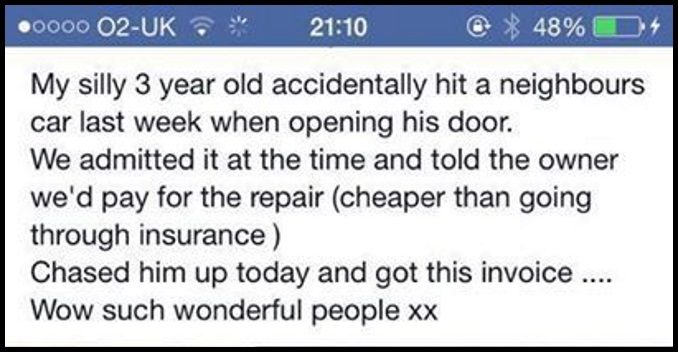
The “invoice” that she received outlined £1,838.00 worth of charges — that’s a staggering $2,340.83 in the U.S. Admittedly, this seems pretty pricey for a simple dent in the door, but all of the fees were clearly laid out, including “Damage repair and re-spray” for £1,500 and “Damage repair and re-spray V.A.T.” for an additional £300.
But, then, the bill took an odd turn as fees for “Numerous cups of tea” and “packets of biscuits while pondering repair” were added. This apparently added up to an extra £38 ($48.40) in unforeseen charges, and we can only hope they were gourmet tea and biscuits for that price. As odd as this charge was though, it was the last item listed that really took her by surprise.
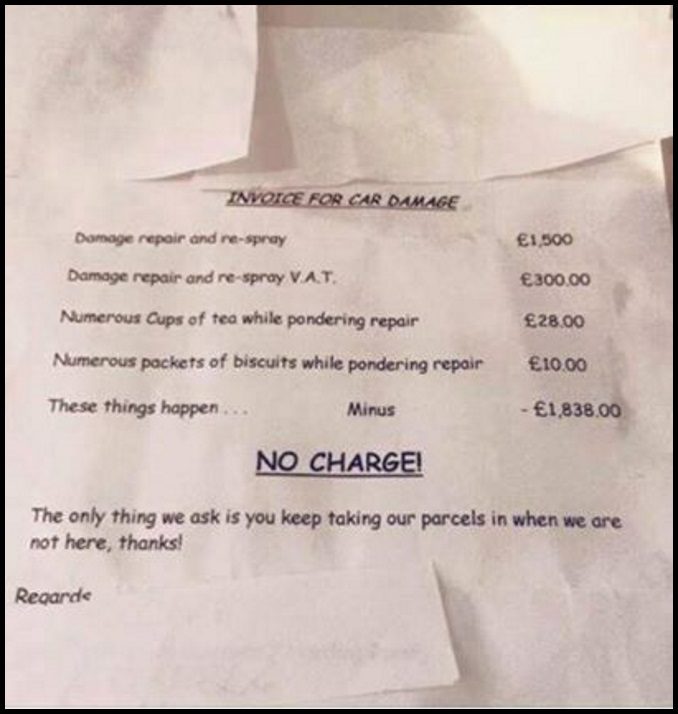
“These things happen,” the last entry on the itemized list of the invoice read, showing the total amount due being deducted from the bill. Just in case there was any question, “NO CHARGE” was boldly added to the bottom. The neighbors simply requested that the mother continued to retrieve their packages for them when they weren’t home, which seems like an easy enough thing to do.
Of course, there’s the usual speculation as to whether the chain of events was fabricated. But, regardless, there’s a moral to the story that holds true even if the events are not. Not only is it a great example of how to be neighborly, which more people could stand to learn in order to facilitate a better sense of community, but it also proves that honesty is the best policy. It’s better to do what’s right, be upfront with someone, and deal with the consequences than to try to deceive them, only to get caught.
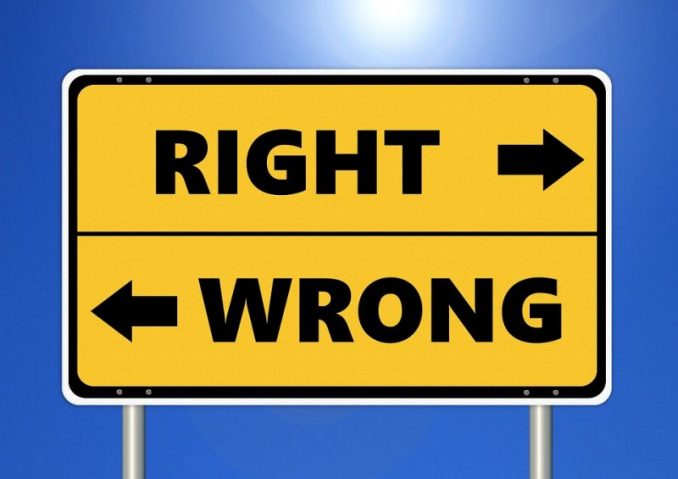
A little honesty can truly keep little problems from turning into huge ones. Own up to a mistake as soon as you make it and do your best to correct it or make it right, and you’ll likely prevent it from turning into a bigger issue that’s much more difficult to solve. What’s more, if we don’t learn from our mistakes, we’re destined to repeat them. But, in order to learn from our mistakes, we must first acknowledge making them.
We might worry that people will think less of us once they’ve seen that we’ve messed up, but acknowledging our mistakes, apologizing for them, and earnestly working to make things right almost always has the opposite effect. Instead of being put off by your error, people respect you for owning it and admire your honesty. Of course, a confession doesn’t always negate consequences, but with honesty, you at least gain trust. The ramifications of hiding your mistake and getting caught, on the other hand, are always greater than just facing issues head-on.
